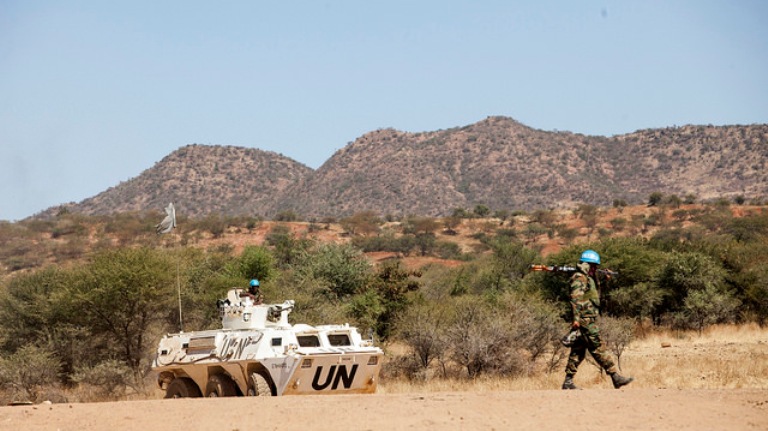Security Council to change Darfur UNMAID mandate and modify force structure: sources

June 11, 2017 (KHARTOUM) – The United Nations Security Council is expected to make major changes to the mandate of Darfur hybrid mission transforming it from a peacekeeping to a peacebuilding mission and to modify its force structure, Sudan Tribune has learnt.
The 15-member body is expected to renew the mandate for the African Union-United Nations Mission in Darfur (UNAMID) as it will expire on 30 June. The Council will discuss the matter on 14 June and will grant the mandate extension for an additional year on 27 June.
Earlier this month Sudanese officials have already alluded that strategic review of the peacekeeping mission agreed recently responds largely to their demands to reduce the deployed troops and reflects the “positive developments” and improved situation in Darfur.
An international diplomat who spoke to Sudan Tribune under conditions of anonymity said that the Council would reduce nearly the half of UNAMID personnel and would close the third of UNAMID team sites in the five states of the region.
“Almost 1/2 the size of the troop strength (44 percent) and 1/3 the police strength (30 percent),” he said adding approximately “1/3 of the team sites ( 11 out of 36) and withdrawing military from 7 other sites”.
Also, the changes will affect the civilian staff as they would be deployed only in the capitals of Darfur five states.
“As a result, the mission will be much more focused on peacebuilding and less peacekeeping,” he said stressing that Jebel Marra is not included in the review and the military presence will remain the same because the rebel SLM-Abdel Wahid refuses to join peace or to commit itself to a unilateral cessation of hostilities.
However, a UNAMID “security assistance force” would be on standby in each state for localised intervention whenever it is needed and the Secretary General can demand the Council in the future to redeploy troops to ensure UNAMID’s mandate.
The Sudanese government is expected to fill gaps left by UNAMID withdrawal.
In line with the outcome of the different assessments conducted on the ground, the mission will focus on the intercommunal conflicts. The UN reports say there is little threat to civilians from the government militias but the violence across the region is mainly about communities fighting each other and competition over resources.
Sudan has demanded since several years an exit strategy for the hybrid peacekeeping operation pointing that the government now controls the region as the armed groups have little presence on the ground.
The region does not witness major displacements this year, but the internally displaced persons continue to demand protection and humanitarian assistance. The IDPs also say cannot return to their land because they fear attacks by government militias, while other IDPs claim that their Hawkers are occupied by the Arab tribes.
During the past years, the U.S. Administration prevented the Khartoum’s allies (Russia and China) in the Security Council to reduce the force strength or to review the UNAMID mandate, pointing to the need for a lasting political settlement.
However, under the President Donald Trump, the United States which pays over 28% of the $7.8 billion peacekeeping budget, considers cutting nearly $1.3 billion of its contribution from October 2017.
The American administration also points to the improvement of the humanitarian access in the region in line to a bilateral agreement reached last year with the Sudanese government over the lift of sanction and normalisation of bilateral relations.
Accordingly, Washington under is expected to back these major changes in the UNAMID mandate.
The last month clashes in North and East Darfur will not affect the modifications in the mandate and force structure.
In a briefing to the Security Council last April, UNAMID head, Jeremiah Mamabolo, described Darfur as being “a very different place from what the region was in 2003”.
The upcoming resolution is expected to reiterate its support to the African Union High-Level Implementation Panel (AUHIP) and calls on the warring parties to reach sign a cessation of hostilities agreement and the engage in a peace process.
(ST)
